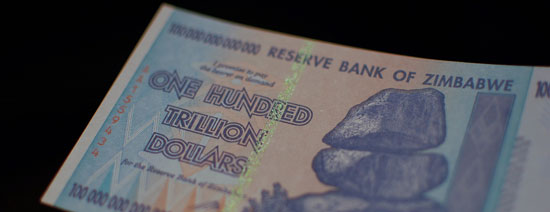Roughly four years ago, Zimbabwe experienced one of the worst cases of hyper-inflation in the history of the world. The country was experiencing 165,000% inflation in April of 2008. That’s an insane number. Typically, hyperinflation is said to occur when the monthly inflation rate exceeds 50%. We’re talking about 3300 times that amount. Say the USA was experiencing that rate of inflation. If you went to buy a pack of Marlboros for $7 today, tomorrow it would be worth $39, then next week it would be $221 dollars. A year later, that same pack of cigarettes would cost $11,557.
The main cause of Zimbabwe’s hyperinflation – and most countries who experience it – is a massive increase in the amount of money that isn’t supported by any type of growth. The country gets a huge imbalance between supply and demand for money, and individuals lose confidence in the monetary system. The body responsible for printing currency, can’t physically print paper faster than the rate the money is devaluing, stopping any attempt to stimulate the economy.
After the worst parts of 2008, Zimbabwe abandoned their own currency and switched to the US dollar. It’s been said that this stopped a complete economic collapse. However, this created a whole host of weird issues.
The bills are filthy and crumbling, with denominations in varying supply. There are no US coins within Zimbabwe, because of how heavy they are and they’re not worth importing. There is an abundance of $2 bills. So restaurants and small stores have a really tough time providing change. At restaurants it’s not uncommon for someone who only has a $20 bill to have to wait around for other diners to pay in small bills to receive their money back.
Also, since very few people have bank accounts, the bills are constantly in circulation and almost never exchanged for newer bills. They stay out on dirt roads, in pockets, to the street money changers, and back to another pocket or street vendor. The bills get so bad that the few people with bank accounts sometimes have trouble getting their banks to accept the notes.
At a shopping center or grocery store, people are forced to take sweets or small fruits to cover change in their purchases. If a guy buys a bag of chips for 80 cents, he’s given two pieces of chocolate at the register, because there are no coins. This type of a situation is not great when the GDP per capita is estimated at $500, but at least it’s better than having useless hundred trillion dollar notes.
